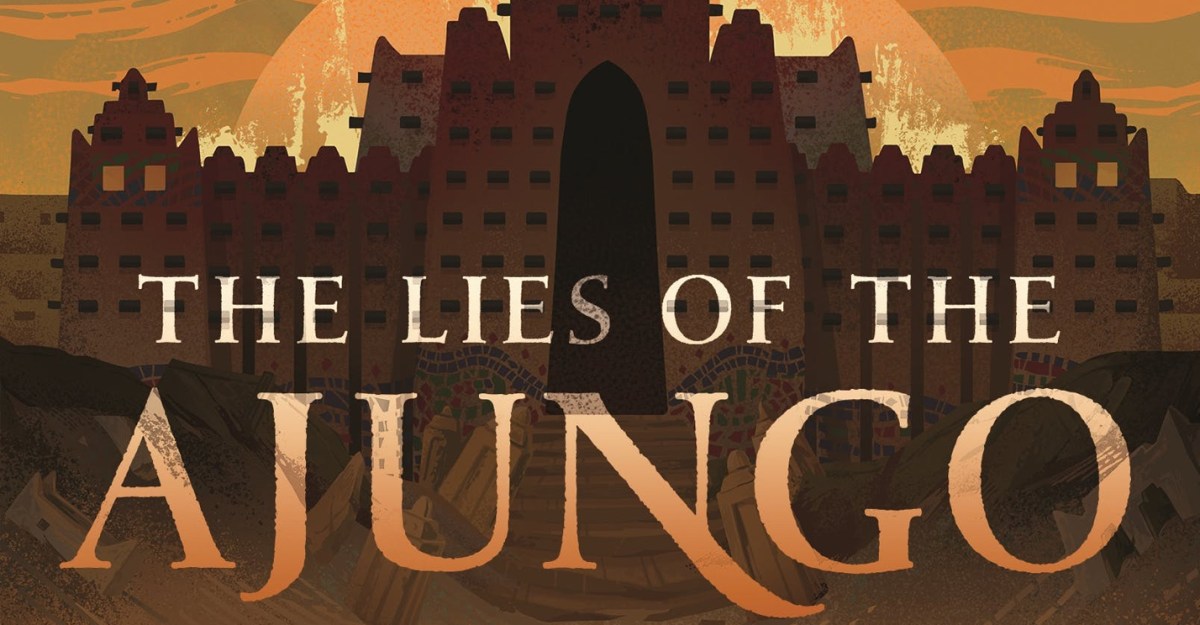Just this year, Moses Ose Utomi has swaggered onto the literary scene. February delivered his well-received debut YA novel, Daughters of Oduma, and he’s followed it a little over a month later with an adult fantasy novella, The Lies of the Ajungo. With this one-two punch, Utomi follows the likes of Veronica Roth and V. E. Schwab in proving a dab hand at navigating the demands of different readerships.
While I can’t personally speak to Daughters of Oduma, The Lies of the Ajungo is a sharp, striking work of Afrofantasy that uses sparse storytelling to phenomenal effect. It’s at once a folk tale and a bildungsroman, following a boy on a quest to find water and hope alongside it.
Before diving into the story of protagonist Tutu, Utomi sketches out a brief history: In the distant past, the Ajungo took advantage of the people’s need, forging a deal that silenced the population and empowered the Ajungo to rename the city as the City of Lies, that no outsiders may ever believe their plight. In the generations since, many children have set out to right this historical wrong, but none have returned. Speaking to issues around entrenched power, the premise is compelling. In just three pages, Utomi outlines the reality of systemic injustice and why it’s so difficult to resolve.
Beyond the walls of the city is the Forever Desert, a world that challenges Arrakis from Dune or Factus from Ten Low in its searing hostility to human life. But just as there is no water in the City of Lies, there’s no water in the desert, so stepping beyond the breach is a fool’s errand.
The hundreds of years of failure have bred a refrain that runs through the book: “There are no heroes in the City of Lies.” But maybe hope is to be found in the latest adventurer.
After the worst day of his life, 13-year-old Tutu steps up because he sees no other options. The years of hardship have made him a realist, yet they have also embedded in him a sense of righteousness. Nevertheless, he is constantly imperiled by his lack of knowledge. Like the other residents of the City of Lies, he knows little of the world beyond. He doesn’t know how to survive or fight or even trust. He’s an innocent in a vicious world, and that’s enough to inspire the reader’s sympathy. As important as these traits are to Tutu’s character, Utomi doesn’t linger on them. Instead, he turns his attention to equipping Tutu with the tools he needs, and it’s a rapid education.
The Lies of the Ajungo is less than a hundred pages long, and Utomi makes every one of them count. When Tutu isn’t learning, he’s unlocking the intricate Gordian knot that sits at the heart of this world. Each new character and story beat pulls the narrative in a new direction. It keeps you guessing but, even more impressively, forces you to re-evaluate what you think you know. There are twists upon twists, and every single one of them lands. This constant narrative movement gives the book an undeniable page-turning quality that had me blasting through it in a single sitting.
Utomi’s sparse prose reinforces that breeziness. From characterization to world-building, the writer boils everything down to the bare essentials. It gives the story a sense of potency, an awareness that everything that is included matters, from Tutu’s shifting relationship with the people he finds in the Forever Desert (written into the way they interact rather than having explicit attention drawn to them) to the vagueness of what’s said and known about the Ajungo.
And ultimately, that quality reflects back on the story as a whole. Yes, Tutu is searching for water and hope, yet even more than that, he is searching for knowledge, for the truth that underpins the workings of his world. It’s an enthralling quest that speaks to issues of fake news and post-truth realities in the real world, and that direct connection gives it a sense of resonance.
The Forever Desert is a brilliant new fantasy world, and Utomi isn’t done with it yet. A further two books are planned. What may be most interesting is that they’re not direct continuations. The Truth of the Akele, due out next year, shifts the action forward 500 years, and the synopsis already available hints at even more twists. For now, though, The Lies of the Ajungo is more than enough to slake the thirst of fantasy fans looking for something genuinely fresh.
A review copy of The Lies of the Ajungo was provided by the publisher.






Published: Mar 17, 2023 07:13 pm